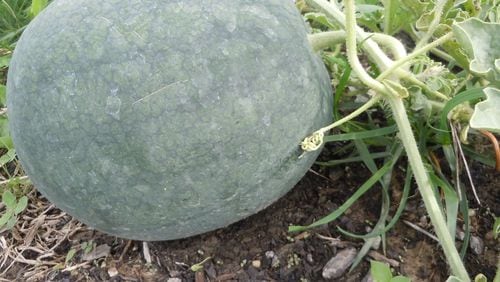Q: I have a watermelon plant that's doing great in a small 3-foot by 5-foot space. It's getting too big. Would it be okay to trim the ends of the plant growth? Angela Flores, email
A: I guess you could clip the ends of individual stems. But remember that the more leaves you have, the more fruit you'll get. Don't be surprised if you have only one or two melons. Consider making a trellis for the vine to climb so you can keep more leaves.
Q: Will honeybees be affected if I apply a systemic insecticide to my crapemyrtle to control aphids? Jesse Jones, Decatur
A: Crapemyrtle flowers don't contain nectar, so the effect on bees is minimal. However, other pollinators visit crapemyrtle flowers to feed on pollen. Native bees and other beneficial insects use the pollen to feed their offspring. Although it is possible to detect systemic insecticide in plant pollen, that does not mean it hurts insects when they contact it in very low concentrations. I'm comfortable recommending systemic insecticide in this situation but you can also choose to do nothing.
Q: Some creature is eating the kernels from my corn ears. Any ideas? Annie Duke, Hampton
A: My bet is that it is mice in your garden. If it were a squirrel or raccoon they would pull the stalks down to the ground. Set mousetraps baited with peanut butter around your garden. Cover each one with an overturned plastic pot. Put a stone under the edge of the pot so a mouse can crawl underneath to enjoy its final meal.
Q: I found a wasp nest growing between the pane and screen of my kitchen window. I feel I should eliminate them as there are children in the house next door. How would you recommend I do this? Paul Newman, email
A: There are a couple of things to consider. First, wasps are, in general, beneficial insects. They eat caterpillars and aphids and other creatures you don't want to have in your landscape. But they can also sting any child or animal they feel endangers them. If they were in an upper-story window, I'd say leave them alone and watch their nest building work from safety indoors. However, if they are near a place where children play, they should be controlled. A quick squirt of Wasp and Hornet spray should work fine.
Q: Have you ever seen tomatoes on Irish potato plants? I have three plants with what I call pomatoes. Charlie Parr, Douglasville
A: They're not tomatoes, just the seed pods of your potatoes. Tomatoes and potatoes belong to the same botanical family so their seed production is very similar. Don't try tasting the pods: they're poisonous! You can dry them and collect the seed to plant next year but don't expect the plants to produce large potatoes.
About the Author






